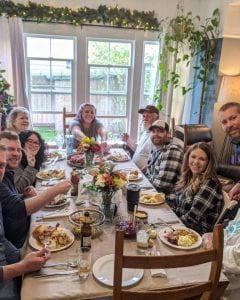Today’s Student spotlight features current LTS student Mary Kate McBride
– blog post by Inês Bernardo Catarino, FLTA-LTS
Tell us a bit about yourself and your background!

Thanksgiving 2021 with of my siblings, aunts, uncles, and cousins that I moved to Oregon to be closer to.
I am originally from Texas, but I have a lot of family here in the Pacific Northwest and I love the weather, so I decided to move up here about 7 years ago. I learned Spanish on and off through my childhood and teen years, and was always self-studying different languages like Mandarin, German, Korean, French, and Bahasa Indonesia. I never got far with most self-study though, because I really learn better in more structured environments with an in-person teacher.
What brought you to language teaching? And to the UO?
I was originally pursuing a degree in Early Childhood Education at the University of Texas Arlington back in 2014, then I changed it up to a Psychology major before I ultimately ended up taking a few years off from school. During that time, I moved up here to be closer to my siblings and made some friends that were attending UO back in the pre-covid days. Those friends inspired me to take a chance and dive back into higher education by applying as a transfer/nontraditional student to the UO. I ended up with a Linguistics major and a Korean minor, with the intent to also pursue the SLAT certification for English. Language teaching seemed like the crossroads of my love for learning language and my original plans to be an elementary teacher, and I had a friend from my original university days who had followed a language teaching path that I was inspired by. Now I not only have my undergraduate degree from UO but am here in the LTS program!
What have some of your past experiences been with language teaching? Do you have any specifically fond memories?
I really had very little teaching experience of any kind when coming into this program. Other than tutoring and volunteering in a couple of elementary schools, my only other experience was in the “Talking with Ducks” (LT 537) practicum class last year. I really loved that class and working with other undergraduates and last year’s LTS students and took a lot of inspiration from them. My mother is also a teacher so that has always driven me towards the field, along with all of the wonderful Spanish teachers I learned from in Texas and here at UO.

My favorite place in the world – Bandon, Oregon.
What has been the highlight of your time in the program so far?
I really enjoyed teaching in the Talking with Ducks (TWD) practicum class a second time, now as a grad student rather than an undergrad as I was last year. My internship last term was also a really amazing experience and has helped me figure out more of the context I am aiming for as a teacher in the future. It also gave me so much valuable information and space to try things put and practice in a way I have previously only really had in TWD. I have also loved getting to know my fellow LTS students. I knew several from undergrad here in the last several years, but meeting new people and continuing to build those older connections and bonds has been such a lovely part of this program.
How do you hope to work in the language teaching field in the future?
I am leaning towards pursuing teaching in Adult ESL education within similar environments to my internship, community night classes at LCC, but I am very open to different contexts, and I am kind of seeing where the wind takes me, so to speak. When I first came to UO, my goal was to teach English in South Korea eventually, but I have since been drawn more domestically. However, I am still open to that avenue being a potential future venture.
What is something outside of language teaching that you are passionate about? A fun fact about yourself that others may not know?

My first visit to Crater Lake, we definitely do not have this in Texas!
I work for the Basic Needs Program here at UO and one of my main responsibilities is as a volunteer coordinator for the Student Food Pantry. I am very passionate about basic needs and particularly food security, so I am always trying to get the word out about our program and resources. We are here to help all UO students with opportunities around food, housing, and financial security. We have a textbook/supplies subsidy, a housing subsidy, as well as a childcare subsidy that any student, including all grad students, can apply for to get financial assistance, so definitely reach out to the UO Basic Needs Program if you (or someone you know) ever need a helping hand as a student! There’s actually a great intersection of food security and education that I have found to be an amazing space, and I think even language educators can always stand to learn more about these sorts of struggles and programs to alleviate them, as many of the students we will have in our careers are people who could benefit from such assistance, and may be struggling with meeting their basic needs outside of the classroom.
